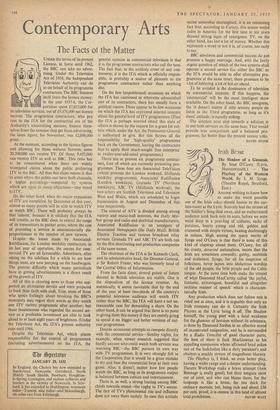Irish BrDse
ANYONE wishing to know how to make the worst possible use of the Irish ethos should hasten to the cur- tain-raiser at the Lyric. Scarcely had the strains of the Soldier's Song died away, and an embarrassed audience sunk back into its seats, before we were waist deep in a peat-hag of colleens, sacks of potatoes, hearts young and old, golden and crammed with simple virtues, beating deafeningly in unison. High among the many merits of Synge and O'Casey is that there is none of this kind of claptrap about them. O'Casey, for all his crusty, deracine nationalism, insists that the Irish are sometimes cowardly, gabby, snobbish and malicious. Synge, for all his suspicion of folksiness, never lapses into idolatrous worship of the old people, the little people and the Celtic tongue. At the same time both make the utmost of what Desmond MacCarthy called 'the joyful, fantastic, extravagant, beautiful and altogether reckless manner of speech' which is character- istically Irish.
Any production which does not follow suit is ruled out at once, and it is arguable that only an Irish company can do it. Certainly the Irish Players at the Lyric bring it off. The Shadow himself, the young poet with a fatal weakness for the glamour of heroism without its substance, is done by Desmond Jordan in an effective mood of exasperated resignation, and he is surrounded by a Radio Tintesful of good character parts; the best of them is Jack MacGowran as his appalling companion whose affronted head pokes out of the bedclothes like a dirty parakeet's and chatters a muddy stream of magnificent blarney. The Playboy is, I think, an even better play, having a wider range and a deeper understanding. Theatre Workshop make a brave attempt (Avis Bunnage is really good), but their tongues seem out of joint, and who can blame them; for the language is like a brose, far too thick for ordinary mortals; but, being rich and about 150 per cent. proof, it is manna in this land of almost


































 Previous page
Previous page